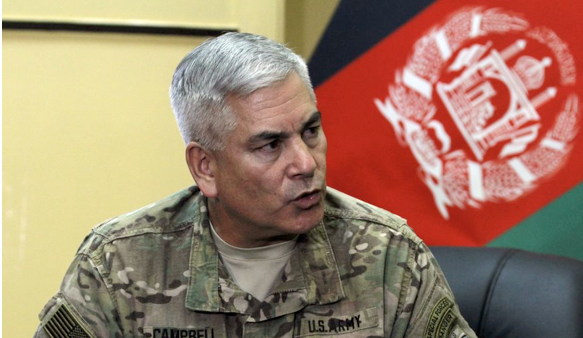CommentsWAR LORDS--If the highest ranking U.S. and NATO military commander in Afghanistan gets his way, America's longest official war could become even more protracted.
Army General John Campbell said in a USA Today article published on Tuesday that he wants to keep the 9,800 American troops currently in Afghanistan there for as long as possible—and is considering asking for even more boots on the ground.
"My intent would be to keep as much as I could for as long as I could," Campbell told the paper from Kabul.
"Every time I've gone to the president and said, 'I need X,' I've been very, very fortunate that he’s provided that." —Army General John Campbell
The general's comments follow President Barack Obama's October announcement that he plans to reverse his prior pledge to remove all but 1,000 U.S. troops from the country by the conclusion of 2016. Instead, Obama proclaimed that the 9,800 troops will be maintained through most of 2016 and then cut to 5,500 by the beginning of 2017.
Even then, Obama's statement came despite the official declaration a year ago that the war was "over."
But now Campbell plans to ask the president to put off troop withdrawals even further by delaying the reduction to 5,500 troops.
"If I don't believe that we can accomplish the train, advise and assist... the (counter-terrorism) missions, then I owe it to the senior leadership to come back and say, 'Here's what I need,'" Campbell said. "If that's more people, it's more people."
The general expressed confidence that he will get his way. "My job as commander on the ground is to continually make assessments," Campbell said. "Every time I've gone to the president and said, 'I need X,' I've been very, very fortunate that he’s provided that. So he’s been very flexible."
Campbell's comments come as the U.S.-led war in Afghanistan stretches well into its 15th year—and appears certain to extend into the next presidency. While many argue that the Afghanistan intervention is not, in reality, the longest war in U.S. history, it is widely recognized as the most protracted according to the official record.
What's more, the Bilateral Security Agreement signed in 2014 by the U.S. and Afghanistan locks in another decade of heavy American involvement in the country, including the training, funding, and arming of the Afghan military. The pact also secures immunity for U.S. service members under Afghan law—a highly controversial measure in a country that has suffered civilian massacres by U.S. troops.
The U.S. is planning a military role long into Afghanistan's future despite indications that its long-term intervention and occupation so far has worsened conflict and violence, with the Taliban now showing signs of increased strength.
Meanwhile, Afghan civilians continue to pay the greatest price. In the first half of 2015 alone, United Nations agencies documented 4,921 civilian casualties (1,592 deaths and 3,329 injured).
(Sarah Lazare writes for Common Dreams …where this piece was first posted.)
-cw
CityWatch
Vol 14 Issue 1
Pub: Jan 1, 2016
Sidebar
Our mission is to promote and facilitate civic engagement and neighborhood empowerment, and to hold area government and its politicians accountable.

 CityWatch Los Angeles
Politics. Perspective. Participation.
CityWatch Los Angeles
Politics. Perspective. Participation.
21
Sat, Feb














